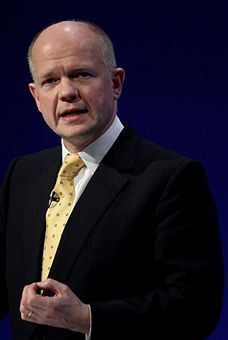 In a splurge of activity, William Hague gave both an interview to the FT and another foreign policy speech at RUSI outlining the views of a Conservative government. It was time for an update on Tory thinking, not least because David Cameron’s description of his policy as “liberal conservatism” and his unwillingness to march into a “massive euro bust-up” has had little effect.
In a splurge of activity, William Hague gave both an interview to the FT and another foreign policy speech at RUSI outlining the views of a Conservative government. It was time for an update on Tory thinking, not least because David Cameron’s description of his policy as “liberal conservatism” and his unwillingness to march into a “massive euro bust-up” has had little effect.
That is because a struggle over how to engage with the world continues to run beneath the party leader’s message of party unity. Four main schools of diplomatic thought exist in the party: the modern Realists, the Neo-Conservatives, the anti-Europeans (not the same as the Euroskeptics, which describes everyone who matters) and the “Localists”, populated by members and candidates who are so grounded in local issues that they have no international outlook or interest and tend towards isolationism. Each one tugs at the Conservative leader’s foreign policy heart.
William Hague seems to be a modern Realist. He eschews the unilateralism of old-school Realists, who criticised Harold Macmillan for aligning Britain too closely with the US, but is no naïve multilateralist. He seems to want reconcile the traditional Tory emphasis on the sovereignty of the nation state and aversion to grand designs with a promotion of British values by means of diplomacy, and trade as well as multilateral and European cooperation where it makes sense.
I have been a bit critical of Hague’s past speeches, but I like the tone and direction of his recent remarks. Yes, Britain’s role in the world will invariably decline. Yes, other countries like China and Brazil are on the rise. But no, this does not mean isolationism or forelock-tugging deference to powerful passers-by is right. “If our influence is under challenge, which it certainly is, then our approach must not be to limp away disconsolately, but to pick ourselves up and make the most, systematically and strategically, of our great national assets”. A great sentence and a great sentiment.
How to achieve all this? First, through economic vitalisation. Hague does not say much on this, and certainly a lot less than a French or a German minister might. The second point is about strengthening the Foreign Office. This will be ridiculed by many, who think diplomats do nothing but drink champagne and eat caviar. But nothing could be further from the truth and Hague’s line that the office he might serve “possesses many people of great calibre and dedication” is true and will go down well.
Policy-wise, the Shadow Foreign Secretary is tough on Iran, and committed to helping Pakistan stabilise itself. The reference to India is particularly positive. A Conservative government will also “be open to improved relations” with both Russia and China but wary of the likelihood of change in the two countries – a position not dissimilar to Labour’s – and far better than the more belligerent sounds coming from some members of the Tory front bench.
I am not sure that UN Security Council reform is in Britain’s interest, but let’s assume Hague’s support for this Third World cause is tactical. Nor do I see much use in the Commonwealth, which every opposition party says it wants to prioritise but in government realise can do little except exist. The former Tory leader’s remarks about Europe are worth dwelling, though. If the Tories win the coming election, they “will be active and activist in the European Union from day one, energetically engaging with our partners.” They will work with Catherine Ashton and focus on areas they think the EU can influence, like the Balkans. This is sensible policy and echoes what many other European governments think. Federalism is dead, pragmatism is in, and the Tory party looks set to capitalise.






Comments